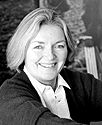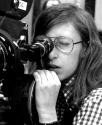Director: Cynthia Scott
Debut feature: The Company of Strangers (aka Strangers in Good Company)
National Film Board of Canada


At what point in your life did you know you wanted to be
involved in film? What were the precursors?
Oh, that's an interesting question. I loved film, I guess I've always
loved film, but I became very attached to it at the university. I think
I thought film directors were men only, and I ended up working in
television after university -- I don't know what they're called in the
states, up here they're called script assistants -- and I worked as an
assistant to a producer director. I slowly began to realize that it
wasn't a male sensibility, that women, too, could conceive of doing this
work. I became a television producer, and then I
started doing short films, I just kinda lucked into it. There came a
point where I just didn't want to do television anymore, I just wanted
to do film, and that started out being documentary. Then later on I
became interested in dramatic film, film with actors.
Company of Strangers is the only feature I've done, in the states I
think it's called Strangers in Good Company. And I just came up
with...this idea popped into my head of wouldn't it be wonderful to do a
film in which the stars are all older people. And it just seemed logical
that that would be a feature length movie. So it was the idea that
caused me think of doing a feature length film, it wasn't "I want to do
a feature length film", it was the idea that said, if you're going to do
this topic, it's going to be a feature length movie.
Working with elders, is there something special about your life that
made that appeal to you?
No, actually, I was casting for a little short dramatic film -- it took
place in a hospital, in a ward where there were chronically ill people
and old people, who, for better or worse, ended up in a hospital, rather
than in institutions -- and I was looking for some older women to be
extras in this ward. I went to a fabulous community club for seniors, it
was called the Golden Age Club, and it was a Jewish club, it
was part of a huge center that does a lot of things for the Jewish
community. I walked into this place one morning, at 9 AM, and I
opened the front door and it was like being blasted by heat, there was
so much energy and activity going on inside. These were all senior
citizens -- there were drama clubs and art clubs -- there was so much
stuff going on and there was so much energy that I was just blown away
by it. And it was literally at that moment that "Oh my God, look what's
here, try and explore that". So I was just overwhelmed, because,
outside of immediate family members, I had never spent much time with
older people at all. And so that started me thinking about doing a film.
Those people may have been particular and special, because
they were nearly all people who had either come over as very poor immigrants,
so that none of them had finished school: the men had probably been
working since the age of twelve and the women would have gone to work in
their mid teens: they were either that or they were holocaust survivors.
So I think they had an extra hunger for life, maybe. Many of them
were getting the educations they'd never been able to have in their
youth, because they needed to earn money to support their families.
Anyway, thanks to that place, this project arose.
At what point in the production of Company of Strangers did you know that something 'magical' had taken place?
During the shooting, the first couple days were scary for all of us;
was this going to work? Very soon I thought that something very
extraordinary was going on here. My producer-editor, who was not on set, and
was looking at rushes, did not feel that. He felt that it was all sort
of cliché ridden. I didn't feel that at all. Anyway, he ended up falling
in love with it once he started to edit it. But there was just something
about being out in this landscape, which had been a decision I had made
early on, that I had wanted to set the film somewhere free of the
confines of the city. I didn't want the women stepping over cables, all
of the machinery that's a part of making films, and also, I guess in a
way, the idea was to put them in a landscape to set them free of the
world as they knew it. All of those women lived alone, all except for
[Alice] who lived in the arms of her family. And all of them felt
marginalized, and out there in the countryside, the beautiful countryside
surrounded by a crew, they became the center of the universe, and they
just blossomed with a sense of their worthiness: I mean they were
doing work, and it was meaningful, and they were being paid for it, and
being respected for it. It was just a combination of many things, I mean
you're right, it all seemed to me to be sort of miraculous; it could
have gone the other way, their blossoming, and their wonderful
individual personalities, and their superb naturalness. Everything was
all fake and fiction, but it all felt real and wonderful in some way.
This is a cliché that I'm sure many filmmakers have said to you, you
know, the film takes on a life of it's own, it's like a child growing up.
I mean you know you were involved with it, but it seems to have it's own
life. One of the things that pleases me enormously is that it continues
to have a life -- or I hear little nuggets: I was at a Christmas carol
service this year and there were a group of elderly Anglican nuns at
this service, and it turned out there was a little reception for anybody
who attended the services afterward, and I was introduced to these nuns,
and it turned out that they used the film to do community work: they
do a lot of work with women who are estranged or abandoned or battered.
And they use the film as an example of strangers becoming empowered. I
mean I was just so enchanted, these are virtually cloistered nuns,
and they use this film. And of course they think the nun in the film is
the heroine of the film, which delighted me: I mean I never think of
her as the heroine, but they did [because] of course she saves them.
The film was a gift to all of us, in the end, you know, the fact that it
worked was a miracle, and everybody who worked on that film, the
actresses, certainly, all said it was one of the best moments in their
lives. It was a gift to us all.
Tell us about your decision not to include men in the cast.
Initially I had thought that the cast would be men and women, and my
first idea was that it was going to be the coming together of a former
chamber orchestra, 'cause I had had the fantasy of seeing people playing
cellos and violins in a landscape. So I did a lot of research with old
musicians in Montreal, to see if I could find a cast that way, and in
fact, I mean, nothing excited me: the people I found were lovely but
they weren't movie star material in the sense of being people you wanted
to watch on the screen; they all had a kind of blandness to them. Well
then it was going to be I was going to strand some people on a landscape,
and we started doing auditions. I had done a lot of of hunting through
the streets of Montreal through various organizations, looking for
potential cast, and a number of people in the film were people I had
actually met. But hundreds came to the auditions, and, in the
proportions of that age, I would say there were 4 to 5 times as many
women as men, because that's what the statistics are: in terms of people
in their 70s and 80s, there are more women alive than men. In the
auditions, women I was interested in I would call back for a second
audition. These were always improvisations, and so there were women
that I had been very interested in 'cause they had a kind of inner
integrity and a kind of honesty of self that made them quite powerful
on the screen: Alice, the Mohawk women, being an example. So I would
sometimes do an improv where I'd have 3 or 4 women and one man, and if
there was a man in the improv the whole chemistry changed: the women
became much more docile, much more coquetteish, more passive and demure,
and they would let the man take control. It clearly came from, I guess,
their upbringing, in the times they lived through, but the man just took
over, and these women and their wonderful spirits just disappeared. I thought oh-oh, I don't want this film to be a film about the battle of
the sexes of people in their 80s. I wanted to see the potential of the
characters and their humanity and their strength. So I just gave up men,
so I could see the women be what they were, rather than these demure
little silly creatures they became. Maybe I could have worked that out
but it just added a complexity that I thought I just don't need to go
there. So it was goodbye to men.
As a woman, did you face any gender barriers to
getting the film made or getting it distributed?
No. At that point at the Film Board I was respected as a documentary
person, I had done a film called Flamenco at 5:15 which had won an Oscar
and there had been a number of films already made by men at the board
using this kind of process of doing a fiction film, but using non-actors.
No woman at that point had come forward with an idea, but the idea
seemed of great interest to the people at the Film Board. I mean the
film never would have been made if there wasn't something called the
National Film Board of Canada. No private producers were going to invest
in a film about 'boring old people', none of whom were famous actors,
knowing full well that the project could have failed. We hoped it
wouldn't, and we had done everything we could to make sure it was
probably going to be a success, but the women could have fallen ill,
one of them could have died, or it just might not have worked. I don't
think that film would have ever happened if it hadn't been for the Film
Board. But no, once I had proposed it, and they had said yes, there were
no obstacles.
An article on women directors at Salon.com states
that 96% of films are directed by men. Does this ring
true for Canada, and how do you feel about this?
Oh, I'm sure this is changing, but that's no doubt why I as a young
woman thought only men could be film directors. I thought
you had to be some kind of super genius. I'm retired now, so I'm
slightly removed from the film scene. Of course, men still dominate here,
but there are a lot of young women and middle aged women doing good
stuff. I mean there are outstanding established directors here in
Canada and I'm sure there are a ton on the way. It continues not to be
easy to make films in Canada, films get more and more expensive, and
producers want more and more of a guarantee that the film is going to
make its money back. The whole digital thing may transform all of that.
I think it's hard to do independent films that maybe aren't percieved as
commercial. It must be the same in the states. Maybe there will be...I
mean right now it's film as entertainment, right? You go to your
Cineplex downtown and 9/10ths of what's on the screen one has no
interest in watching, but there obviously is an audience that is
watching. Good films have a way of surfacing, and maybe there will be a
swing around to stuff that's more than entertainment. Certainly in
Canada, this extraordinary thing has happened in the realm of literature.
Women writers are the stars of Canadian literature, I mean there are
some wonderful male writers as well, but there's this huge cluster of
women novelists who are now commanding international respect. Maybe that
will happen in cinema too. Cinema is just more expensive, it's not
just you alone; that's the problem. You need to hire a crew, you need to
hire a whole symphony orchestra, it's a much more complicated process.
You were a participant in a Women in the Director's Chair workshop in Banff. Tell us about that experience.
I went there, actually, for me, it was like just going there to practice
my scales. I hadn't directed anything in a while and was about to embark
on directing a feature The Stone Diaries based on Carol Shield's novel,
and so I went there to workshop some scenes in that script just to tone
myself up. It was a terrific experience. It was very valuable to me and
it was just a lot of fun being with other women directors in an
intensive workshop there to help us all. Unfortunately I became ill a
year and a half ago and the project was abandoned and I don't know
whether it's going to resume or not.
Would you say that women supporting women is the key to fostering more
women directors?
Oh, I think so, absolutely. In terms of Company of Strangers, I had a
core group of people working with me: the associate producer, a number
of p.a.'s, my writer, my assistants, were all women. And the crew was
male. But right between me and the crew was this group of women who were
totally supportive of what I was doing. Even though the producer-editor
back in Montreal was pooh-poohing what we were doing, I did have this
support from the other women who thought what we were getting was
remarkable. So sure, female support is enormously helpful because,
although we are all individuals, I think that there are things that
interest us women that are of less interest to men. I'm sure that workshop was terrific, and
I'm sure it helped kick-start a number of women into becoming directors,
or improving their directing skills. - Cynthia Scott, January 2004
The Company of Strangers (Strangers in Good Company)
Available on DVD at Amazon.com
See also the companion book In The Company of Strangers by cast member Mary Meigs
Available at Amazon.com

















